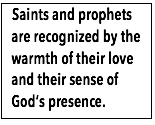|
An idealistic young priest once visited Thomas Merton at
the Trappist monastery in Kentucky and spoke to him about
his agony over social justice issues. “I know
it’s wrong,” he said, “and sometimes I
can hardly face myself in the mirror for going along with
things as they are. Yet I don’t know what to do.
What can I do?”
“Don’t do a damned thing,” replied Merton. “Just take the
time to become what you profess to be. Then you will know
what to do.” If Merton had less credentials in the area of
social justice, his answer could easily be seen as a
rationalization, an excuse to escape involvement. Given
his record, however, it is a profound answer. The answer
of a saint to the agonizing question: What can I do in the
area of social justice?
What can we do? In the circles that I move in, on this
question, there is enough talk, enough agonizing and
enough guilt, but little in the way of practical action.
At our roots, many of us feel that we need to do something
about injustice and poverty. We feel guilty about being
affluent, but we feel helpless: “I have enough
problems of my own! I have trouble paying my own mortgage,
how can I save the world!” Or, as a friend of mine
recently said: “I don’t know what to do. So I
go to a lot of meetings and read a lot about poverty and
the Third World. It’s making me more sensitive and
assuaging my guilt somewhat, but, in the end, I am still
not doing anything concretely.”
What finally can we do?
 Merton’s answer is that if we don’t know
what to do, then we are still not ready to do anything. If
we are still asking what to do, if our own problems are
still too distracting, and if we are having trouble
looking at ourselves in the mirror, then we are still too
caught up in our own neuroses, ambitions, woundedness and
false values to be of much help to the poor. We are still
too poor ourselves. Our lives are not yet lives of praise
and gratitude, lives that, by necessity, spill over and
pour out graciousness. Our service, our prophecy and our
resistance are still too self-seeking, too motivated by
guilt, too distracted by wound and bitterness and anger. Merton’s answer is that if we don’t know
what to do, then we are still not ready to do anything. If
we are still asking what to do, if our own problems are
still too distracting, and if we are having trouble
looking at ourselves in the mirror, then we are still too
caught up in our own neuroses, ambitions, woundedness and
false values to be of much help to the poor. We are still
too poor ourselves. Our lives are not yet lives of praise
and gratitude, lives that, by necessity, spill over and
pour out graciousness. Our service, our prophecy and our
resistance are still too self-seeking, too motivated by
guilt, too distracted by wound and bitterness and anger.
To be a prophet of justice, an instrument of peace and a
channel of graciousness necessitates that one be living
more in gratitude than in anger, more in the posture of
praise than the posture of paranoia.
But this isn’t easy. Too often our prophecy, our
service and our resistance are motivated by guilt over our
own affluence or by anger at our own culture. When that is
the case, we do not truly help anyone. Our actions are
simply self-aggrandizing and, in the end, serve to extend
our own neuroses, ideologies and bitterness to the poor.
There is no outflow of graciousness.
Resistance, prophecy and service must flow from a life
which is full of gratitude, celebration, deep friendship
and contemplative prayer. When these elements are there,
graciousness automatically spills over. One knows what to
do!
That is what is implied in Merton’s answer. Only
when a person has grown in prayer, friendship and
gratitude so that the bitter need to kill, to defend self,
to be jealous and to be angry because one has been
wounded, disappears, will one truly be able to resist,
prophesy and serve.
Saints and prophets aren’t characterized by
bitterness, guilt or anger. These do not serve the poor.
Saints and prophets are recognized by the warmth of their
love and their sense of God’s presence. That is why
Merton tells that young man: “Take the time you need
to become what you profess to be…don’t rush wounded,
self-preoccupied, ill-prepared and badly motivated into
the crisis.”
In a crisis, at an accident or a fire, things are not made
better, nor is anyone helped, by someone who is too full
of personal crisis and self-interest to be self-forgetful
enough to genuinely give himself over to the task at hand.
Persons caught in self-interest are more part of the
problem than of the solution – both at fires and in social
justice.
This answer is not a dangerous privatization of morality,
an escape clause for the rich, a shutting of the ears to
the urgency of the cry and hunger of the poor. It’s
a refusal of the blind to lead the blind. It’s the
admission that it is hard to save the world when one must
still be engaged in the humbler task of growing up. It is
a taking seriously of one’s woundedness and
narcissism. Most important, it is a challenge to move
beyond present complacency, to begin the painful task of
uprooting bitterness, resentments, paranoia, self-pity,
jealousy, self-interest, laziness, neuroses, and rerooting
in prayer, gratitude and friendship, so that when the poor
cry out we know what to do.
In the meantime, many of us are reduced to a certain
impotence as we live the question.
Ron Rolheiser
|